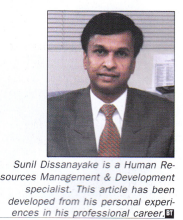
Do you have ‘difficult people’ working in your organization or are you, one of them?
Do you deal with irate, rude, impatient, insensitive, emotional, selfish or aggressive people at work? If you do, do you avoid professional contact with them or do you try to keep only a minimum contact with such persons in your
organization? Do you arrive home from work stressed out from having to deal with a difficult supervisor, a difficult peer or a difficult subordinate?
Most businesses today have identified the need for hiring employees who are capable of handling all types of difficult people and also as much as possible avoid hiring difficult people altogether.
In my previous place of employment we used to achieve this by psychometric testing, as a first step in the interview process to measure the personality of the candidates, prior to a focussed face to face interview. (There are many types of computer based psycho- metric tests available, ranging from 6 minutes to 1 hour).
According to psychologists, difficult people at work are those who try (among other things) to,
- make us lose our cool.
- force us to do things we don’t Want to do.
- prevent us from doing what we need to do.
- often use coercion, manipulation, interpretation, and ambiguous situations to get their way.
- make us feel guilty if we don’t go along with their wishes.
- make us anxious, upset, frustrated, angry, depressed, inferior, defeated, inadequate or have any other negative feelings.
If you are working in a country outside Sri Lanka with a multicultural workforce, difficult, behaviours may vary according to the background of the individuals. Psychologists have found that employees behave in a difficult manner to overcome their own feelings of inferiority, physical handicaps. personality problems, communication deficiencies, rejection etc.

Working with difficult people means handling difficult behavior. We may not be able to control other people’s behaviour directly. But by managing our behaviour and communicating effectively, we can influence the difficult employees ( whether they be our supervisors, peers or subordinates) in a positive way. We can then hopefully, turn their difficult behaviour into civilized , constructive behavior.
Handling difficult employees involves managing your side of a two-way transaction. This will enable the difficult person to work with you (to remove irritants if any), to resolve whatever is making the person difficult. My observation is that most of the time, when we encounter a difficult person or a situation we react in ways which make the problem worse remember two hands are needed to clap), by becoming defensive rather than attempting to deal with the real issue. This type of response reduces the chances of transforming negative behaviour or a situation into a constructive opportunity
In my professional career. I have learnt not to react negatively or be defensive in handling difficult people or situations, by mentally refusing to accept the the negatives thrown at me. I accomplish this by stopping my defensive mechanisms from reacting, it takes practice and you can achieve it if you set mind to it).
Professionalism of the people you work with, to a large extent, creates an amicable atmosphere at work. In most instances, our jobs are interdependent and each employee’s effectiveness and professionalism are usually tied in some way to how well we perform our individual roles in the organization. The unprofessional behaviour of a single employee can impede the effectiveness of many.
So, as soon as you feel yourself getting uptight with difficult or unprofessional behaviour stop and analyze the situation and develop an action plan to turn the situation to a positive one. Practise how to control your anger and stress levels and obtain a psychological edge. Ability to effectively deal with difficult people and situations can enhance your confidence, improve your competence. reduce stress and anxiety and increase your enthusiasm for your job .




